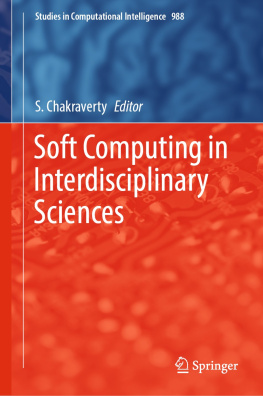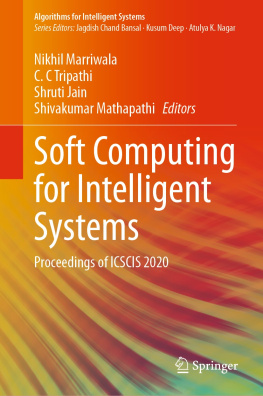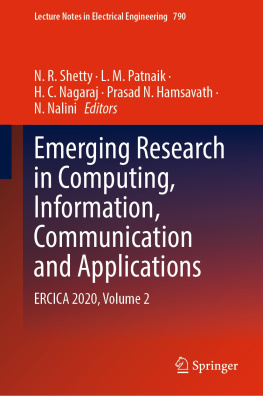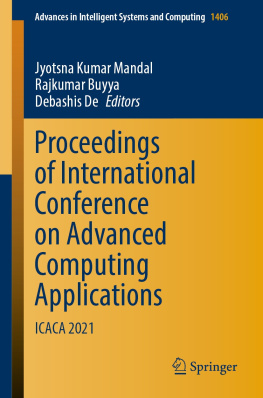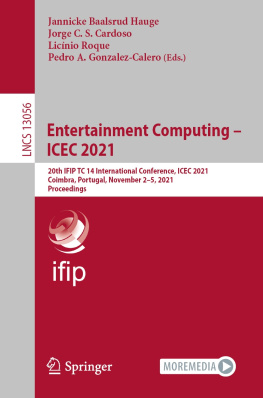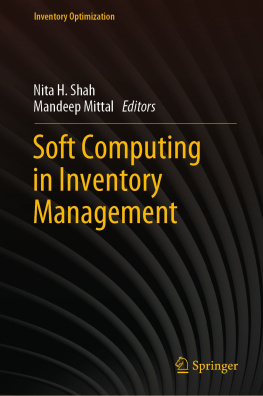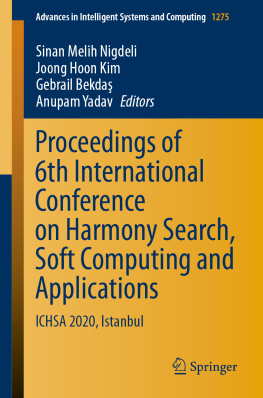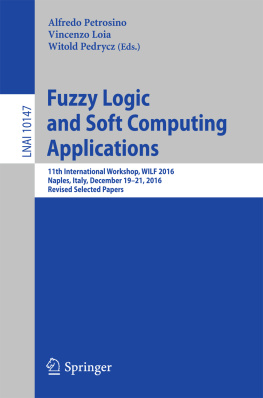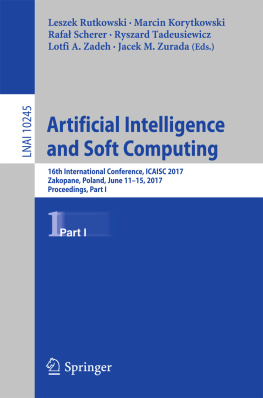Advances in Intelligent Systems and Computing Volume 510
Series editor
Janusz Kacprzyk, Polish Academy of Sciences, Warsaw, Poland e-mail: kacprzyk@ibspan.waw.pl
About this Series
The series Advances in Intelligent Systems and Computing contains publications on theory, applications, and design methods of Intelligent Systems and Intelligent Computing. Virtually all disciplines such as engineering, natural sciences, computer and information science, ICT, economics, business, e-commerce, environment, healthcare, life science are covered. The list of topics spans all the areas of modern intelligent systems and computing.
The publications within Advances in Intelligent Systems and Computing are primarily textbooks and proceedings of important conferences, symposia and congresses. They cover signi cant recent developments in the eld, both of a foundational and applicable character. An important characteristic feature of the series is the short publication time and world-wide distribution. This permits a rapid and broad dissemination of research results. Advisory Board
Chairman
Nikhil R. Pal, Indian Statistical Institute, Kolkata, India
e-mail: nikhil@isical.ac.in
Members
Rafael Bello, Universidad Central Marta Abreu de Las Villas, Santa Clara, Cuba e-mail: rbellop@uclv.edu.cu
Emilio S. Corchado, University of Salamanca, Salamanca, Spain
e-mail: escorchado@usal.es
Hani Hagras, University of Essex, Colchester, UK
e-mail: hani@essex.ac.uk
L szl T. K czy, Sz chenyi Istv n University, Gy r, Hungary
e-mail: koczy@sze.hu
Vladik Kreinovich, University of Texas at El Paso, El Paso, USA
e-mail: vladik@utep.edu
Chin-Teng Lin, National Chiao Tung University, Hsinchu, Taiwan e-mail: ctlin@mail.nctu.edu.tw
Jie Lu, University of Technology, Sydney, Australia
e-mail: Jie.Lu@uts.edu.au
Patricia Melin, Tijuana Institute of Technology, Tijuana, Mexico
e-mail: epmelin@hafsamx.org
Nadia Nedjah, State University of Rio de Janeiro, Rio de Janeiro, Brazil e-mail: nadia@eng.uerj.br
Ngoc Thanh Nguyen, Wroclaw University of Technology, Wroclaw, Poland e-mail: Ngoc-Thanh.Nguyen@pwr.edu.pl
Jun Wang, The Chinese University of Hong Kong, Shatin, Hong Kong e-mail: jwang@mae.cuhk.edu.hk
More information about this series at http://www.springer.com/series/11156 Tai-He Fan Shui-Li Chen
San-Min Wang Yong-Ming Li
Editors
Quantitative Logic and Soft Computing 2016
Proceedings of the 4th International Conference on Quantitative Logic and Soft Computing (QLSC2016) held at Hangzhou, China, 14 17 October, 2016
Tai-He Fan San-Min Wang
Zhejiang Sci-Tech University Zhejiang Sci-Tech University
Hangzhou Hangzhou
China China
Shui-Li Chen Yong-Ming Li
Jimei University Shaanxi Normal University
Xiamen Xi an
China China
ISSN 2194-5357 ISSN 2194-5365 (electronic)
Advances in Intelligent Systems and Computing
ISBN 978-3-319-46205-9 ISBN 978-3-319-46206-6 (eBook)
DOI 10.1007/978-3-319-46206-6
Library of Congress Control Number: 2016951970
Springer International Publishing Switzerland 2017
This work is subject to copyright. All rights are reserved by the Publisher, whether the whole or part of the material is concerned, speci cally the rights of translation, reprinting, reuse of illustrations, recitation, broadcasting, reproduction on micro lms or in any other physical way, and transmission or information storage and retrieval, electronic adaptation, computer software, or by similar or dissimilar methodology now known or hereafter developed.
The use of general descriptive names, registered names, trademarks, service marks, etc. in this publication does not imply, even in the absence of a speci c statement, that such names are exempt from the relevant protective laws and regulations and therefore free for general use. The publisher, the authors and the editors are safe to assume that the advice and information in this book are believed to be true and accurate at the date of publication. Neither the publisher nor the authors or the editors give a warranty, express or implied, with respect to the material contained herein or for any errors or omissions that may have been made.
Printed on acid-free paper
This Springer imprint is published by Springer Nature
The registered company is Springer International Publishing AG
The registered company address is: Gewerbestrasse 11, 6330 Cham, Switzerland Preface
The Fourth International Conference on Quantitative Logic and Soft Computing (QLSC2016) was held on October 14 17, 2016, in Zhejiang Sci-Tech University, Hangzhou, China. QLSC2016 was the fourth in a series of conferences on quan-titative logic and soft computing. It follows the successful QLSC2012 in Xi an, China, QLSC2010 in Xiamen, China, and QLSC2009 in Shanghai, China. It was a major symposium for scientists, engineers, and practitioners to present their updated results, ideas, developments, and applications in all areas of quantitative logic and soft computing. It aimed to strengthen relations between industry research labo-ratories and universities, and to create a primary symposium for scientists in elds related to quantitative logic and soft computing worldwide as follows:
1. Quantitative logic and uncertainty logic;
2. Automata and quanti cation of software;
3. Fuzzy connectives and fuzzy reasoning;
4. Fuzzy logical algebras;
5. Arti cial intelligence and soft computing; and
6. Fuzzy sets theory and applications.
Early in 2009, at the closing ceremony of the rst QLSC conference in Shanghai, when congratulating the success of the conference our beloved Prof. Guo-Jun Wang said that QLSC is a vey good and helpful opportunity for researchers in the related elds and hope that QLSC should go on continuously. It was very sad that Prof. Guo-Jun Wang left us forever in the winter of 2013; this conference was a memorial to him.
Over viewing the QLSC2016 proceedings, we have put a step forward but still have a long way to go. QLSC2016 received more than 70 submissions. Each paper has undergone a rigorous review process. Only high-quality papers are included. The proceeding contains 61 papers, including 5 invited papers or abstracts from keynote speakers. It consists of 7 parts: (1) keynote speakers; (2) quantitative logic and uncertainty logic; (3) automata and quanti cation of software; (4) fuzzy con-nectives and fuzzy reasoning; (5) fuzzy logical algebras; (6) arti cial intelligence and soft computing; and (7) fuzzy sets theory and applications. vi Preface
Putting together the conference proceedings was a team effort. Special thanks were due to the authors for providing all materials; to all keynote speakers for their kindness to present excellent speeches to the conference; to the program committee and external reviewers for peer-reviewing papers and providing valuable sugges-tions; to the organizing committee and all the local volunteers, especially for their excellent management work for QLSC2016; to Prof. Janusz Kacprzyk for his warmheartedness to suggest that the proceedings to be included in the Advances in Intelligent Systems and Computing series; to Dr. Thomas Ditzinger (Editor at Springer Publishing Co.) for his excellent work on the nal version of this volume; to three graduate students Wen-Wen Zhang, Hong-Mei Wang, and Hao-Yue Liu for compiling work on the papers before submitted to the publisher; and to our main organizer Zhejiang Sci-Tech University in China for the great support. Hangzhou, China Tai-He Fan


